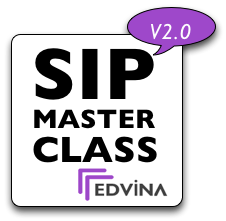The new Edvina SIP Masterclass – Stockholm and Miami this fall!
August 21, 2012
Edvina today launches a new training class, based on years of experience of inhouse and public classes in SIP, Asterisk and Kamailio/OpenSER. The new class focuses on the SIP protocol and the Kamailio Open Source SIP server. By combining lessons on the core SIP standard with the Kamailio implementation and labs, the students will learn interactively and get real configurations to bring home. The new class will launch in October in Stockholm, Sweden and in December in Miami, Florida, USA.
– “We’ve updated the training materials during a series of in-house trainings during 2011 and 2012, which means that the material is almost totally new compared with the original class held seven years ago.” says Olle E. Johansson, Edvina’s founder and the teacher in the classes. “We’ve added more labs and more information about SIP presence and security. For students, this is an upgrade that fits everyone that has worked with Asterisk, FreeSwitch or Yate for many years and wants to learn how to scale and add new SIP services to their solutions.”
Experienced teacher guiding the way
Olle has many years of experience in trainings. He wrote the first Asterisk Bootcamp trainings in 2005 and was the author behind the Digium dCAP certification for Asterisk. Prior to that, he has been doing years of training in TCP/IP networks, from network basics to LDAP directories and SSL/TLS solutions. In addition he’s working as a consultant building large platforms with Kamailio and Asterisk as the primary tools. He has been involved in both Open Source projects since 2002, as a contributor, documentation writer, coder and project member.
From SIP to scalable realtime platforms with Kamailio
This class is built for persons that have used the PBX-class tools like Asterisk, Yate and FreeSwitch and wants to learn how to scale and add new applications like presense and instant messaging to their solution.
The class will spend a lot of time on the SIP standards, then move on to how to implement them using Kamailio – the Open Source SIP server – in combination with other tools. After the class, you will not only know how to operate Kamailio – you will also have a lot of knowledge about how the SIP standard works, what to expect from devices and how to troubleshoot your realtime network.
PS: A special thank you to Redfone Communications in Miami that hosts our training in December!
SIP2012 :: Redefining SIP
August 14, 2012
Edvina today launched SIP2012 – a project to try to redefine SIP in the eyes of all customers to our industry. We need to go beyond the 10-year old RFC and use all the solutions developed by the IETF and the SIP Forum during 10 years of SIP version 2.0. We’re not defining SIP 3.0 – but trying to combine a set all the specifications added during this time into a reference profile that customers can refer to and use when buying SIP devices – phones, servers, chat clients, PBXs and much more.
What’s the current state?
It’s very hard for customers to clearly specify functionality required. If they refer to RFC 3261 as a base RFC, that would include S/MIME which is almost never implemented. RFC is updated by 13 RFCs, added to by quite a lot of RFCs and there are 5 verified bug reports (ERRATA) against the text in the RFC.
An example: A large bid for a new telephony platform
Let’s start the discussion with an example. One large bid from last year specified the following standards as requirements:
- RFC 3261: SIP version 2.0
- RFC 3263: Locating SIP Servers
- RFC 3550: Real-time Transport Protocol (RTP)
- RFC 3551: RTP Profile for Audio and Video Conferences with minimal control
- RFC 3487: Priority mechanisms for SIP
- RFC 2833 or 4733: DTMF signalling
- RFC 4855/4856: Media Type Registration of RTP Payload Formats
- RFC 3611: RTP Control Protocol Extended Reports
- RFC 5391: RTP Payload format for G711.1
- RFC 3711: The secure Real-time Transport Protocol
- RFC 5246: The Transport Layer Security (TLS) Protocol
- RFC 2475: Diffserv
What is your opinion? Do you have a good specification that could be useful for other people? Please share!
Reference implementations are important!
We encourage Open Source projects to support the profile and take some extra steps to build reference implementations and test them at the SIPit test events, organized by the SIP forum. Edvina will participate and help tests by building self-test platforms where possible, as we’ve done for TLS, SIP Identity, early media and much more during earlier SIPit events.
Kamailio and OverSIP Open Source SIP Servers are working on implementing SIP Outbound, the first part of SIP2012. We need clients that support it so we can test it for interoperability. Please join this effort!
To find out more – click here for the SIP2012 web with a presentation of SIP Outbound – the first part of the SIP2012 profile.


